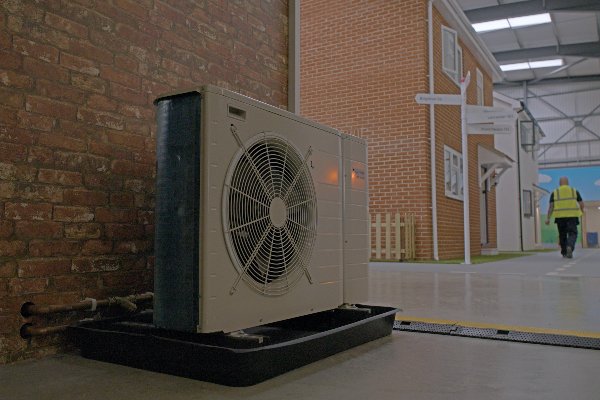Is green hydrogen the answer?
Octopus Hydrogen, founded by the Octopus Energy Group in 2021, is investing £3bn in green hydrogen production with the intention of tackling carbon emissions in hard-to -reach sectors.
But for the time being, green hydrogen is hard to come by, relatively expensive to make and requires a tonne of electricity, so we’ve got to be careful how we use it – and use good alternatives where possible.
Until we have the infrastructure in place to support green hydrogen generation at scale, hydrogen heating would mean piping dirty grey hydrogen to homes, which would extend our reliance on fossil fuels – damaging the climate further rather than protecting it.
Even if we did have enough green hydrogen, a recent review of 32 hydrogen studies in the scientific journal Joule found that hydrogen boilers are actually far less efficient, and more expensive, than heat pumps.
This sentiment was echoed by David Cebon of the Hydrogen Science Coalition who, speaking to the BBC, recently explained that: ‘In the UK, heating homes with green hydrogen would use approximately six times more renewable electricity than heat pumps.’
On a wider, societal scale, the ‘repurposing’ of the polluting gas network for hydrogen would be a huge job, which unfortunately wouldn’t be a case of simply switching
methane for hydrogen.
It would involve changing millions of boilers, as well as ‘relaxing’ 15% of the pipes in the network.
This is also expected to be extremely expensive; in 2020 the UK’s gas networks estimated the cost to be an eye-watering £900m.
If money needs to be spent to change home heating, it may as well be on the most efficient option – an option that uses less green electricity to make more heat.
Why we’re backing heat pumps
Having weighed up the evidence in the race for green heating, heat pumps continue to come out tops.
For starters, they’re a tried and tested technology. In fact, a recent poll found that Octopus heat pump customers were 20% more satisfied with their heating overall than those with traditional heating.
They’re also far more efficient, safer and – given the lack of truly green hydrogen – greener, too.
Heat pumps are also getting cheaper to buy, and run at a much faster rate than their competitors.
According to the International Council on Clean Transportation, ‘By 2050, a heat pump will cost an average £496 a year including energy bills, compared with £1,090 for a hydrogen boiler.’
Given that heat pumps run on electricity alone, they have the ability to give customers some protection as gas prices skyrocket, and pave the way to leaving gas behind all together.
In fact, these days if you’ve got solar panels and a home battery, you can essentially make your home self-sufficient, removing the need to connect to the grid entirely (but we’ll save that for another article).
A warmer future
For a long time, heat pumps were a cottage industry with only a few plucky specialist installers, unable to deliver an affordable heat pump solution to the masses.
Now Octopus is applying its resources and expertise to do just that, helping to build a greener future for everyone.
By investing £10m in building the UK’s first heat pump research, development and training centre, Octopus Energy will soon double the number of green heating engineers in the UK, employing a mighty 1,000 of them. And that’s not all.
These eco-engineers are backed by an all-new crack squad of green-heating geeks, working hard to make heat pumps more efficient than ever before and helping to integrate them with intelligent tech and ‘smart tariffs’.
Where heat pumps already cost around the same to run as a gas boiler, these boffins have enabled smart-tariff customers to save up to 30% on their bills without sacrificing comfort by running their heat pumps at the greenest, cheapest times.
We’re excited to finally see heat pumps, green and great as they are, delivered – and run – for a fraction of the price.
 Play Video about This Rock Might Just Save The World
Play Video about This Rock Might Just Save The World Play Video about Play 2 hours of rock
Play Video about Play 2 hours of rock Play Video about Play 2 hours of brook
Play Video about Play 2 hours of brook Play Video about Play 2 hours of sheep
Play Video about Play 2 hours of sheep











































